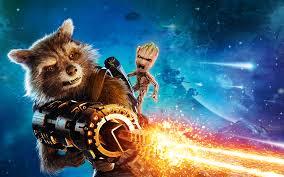Untitled Book, Installment #2
I have a theory about the Hero’s Journey. We all have one. We have many, in fact. But our primary hero’s journey as artists is the passage we live out, in real life, before we find our calling.

Rocket Raccoon overcoming an All Is Lost Moment in “Guardians of the Galaxy”
The hero’s journey is the search for that calling.
It’s preparation.
It’s initiation (or more precisely, self-initiation).
On the hero’s journey, we see, we experience, we suffer. We learn.
On our hero’s journey, we acquire a history that is ours alone. It’s a secret history, a private history, a personal history. No one has it but us. No one knows it but us. This secret history is the most valuable possession we hold, or ever will hold. We will draw upon it for the rest of our lives.
The hero’s journey ends when, like Odysseus, we return home to Ithaca, to the place from which we started. We wash up on shore. We have survived. We have come home.
Now what?
The passage that comes next is the Artist’s Journey.
The artist’s journey comes after the hero’s journey.
Everything that has happened to us up to this point is rehearsal for us to act, now, as our true self and to find and speak in our true voice.
The artist’s journey is the process of self-discovery that follows.
It will last as long as we’re alive, and maybe longer.
THE EPIPHANAL MOMENT
In Hollywood parlance, there’s an inflection point in every story called the All Is Lost Moment. This moment comes near the end of Act Two, about two-thirds of the way through the movie.
In the All Is Lost moment, the hero is as far from her goal as possible. It seems certain in that moment that she will never reach it.
The All Is Lost moment is immediately followed by what I call the Epiphanal Moment.
In the epiphanal moment, the hero experiences a breakthrough.
This breakthrough is almost always internal. The hero changes her attitude. She regroups. She sees her dilemma from a new perspective, a perspective that she had never considered before (or, if she had considered it, had rejected), a point of view that offers either hope or desperation amounting to hope.
The movie now enters Act Three. The hero, fortified by this fresh hope (or desperation), charges full-tilt into the climax.
Sarah Conner stops running and turns to confront the Terminator.
Luke Skywalker boards his X-wing and flies against the Death Star.
Bogey makes the decision to put Ingrid, with her husband, onto the plane to Lisbon, while he himself stays to confront the enemies of freedom.
You and I have All Is Lost moments in our real lives.
We have Epiphanal Moments.
Here is mine, from The War of Art:
I washed up in New York a couple of decades ago, making
twenty bucks a night driving a cab and running away fulltime
from doing my work. One night, alone in my $110-amonth
sublet, I hit bottom in terms of having diverted myself
into so many phony channels so many times that I couldn’t
rationalize it for one more evening. I dragged out my ancient
Smith-Corona, dreading the experience as pointless, fruitless,
meaningless, not to say the most painful exercise I could
think of. For two hours I made myself sit there, torturing out
some trash that I chucked immediately into the shitcan. That
was enough. I put the machine away. I went back to the
kitchen. In the sink sat ten days of dishes. For some reason I
had enough excess energy that I decided to wash them. The
warm water felt pretty good. The soap and sponge were
doing their thing. A pile of clean plates began rising in the
drying rack. To my amazement I realized I was whistling.
It hit me that I had turned a corner.
I was okay.
I would be okay from here on.
Do you understand? I hadn’t written anything good. It
might be years before I would, if I ever did at all. That
didn’t matter. What counted was that I had, after years
of running from it, actually sat down and done my work.
That was my epiphanal moment.
My hero’s journey was over.
My artist’s journey had begun.



